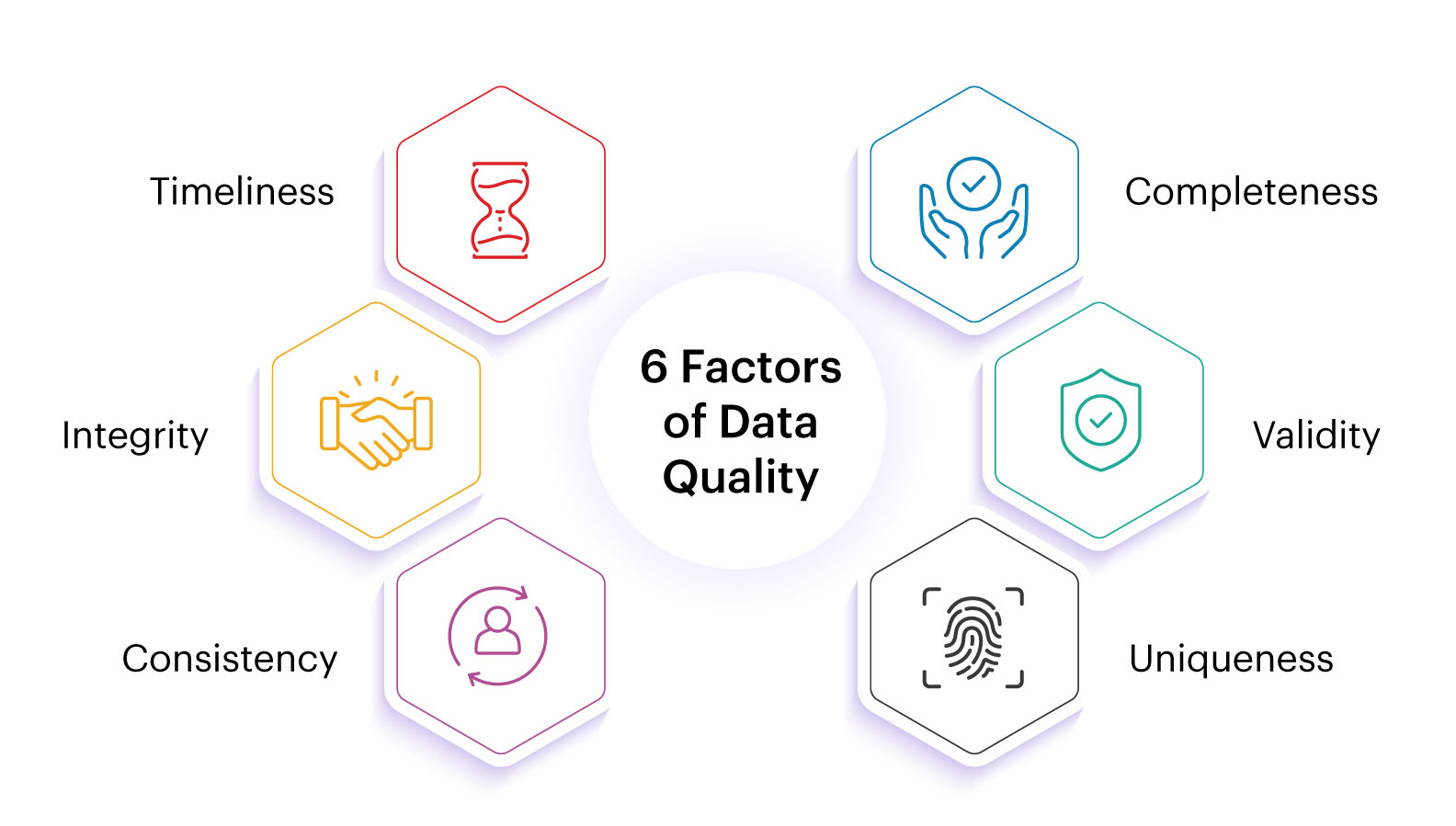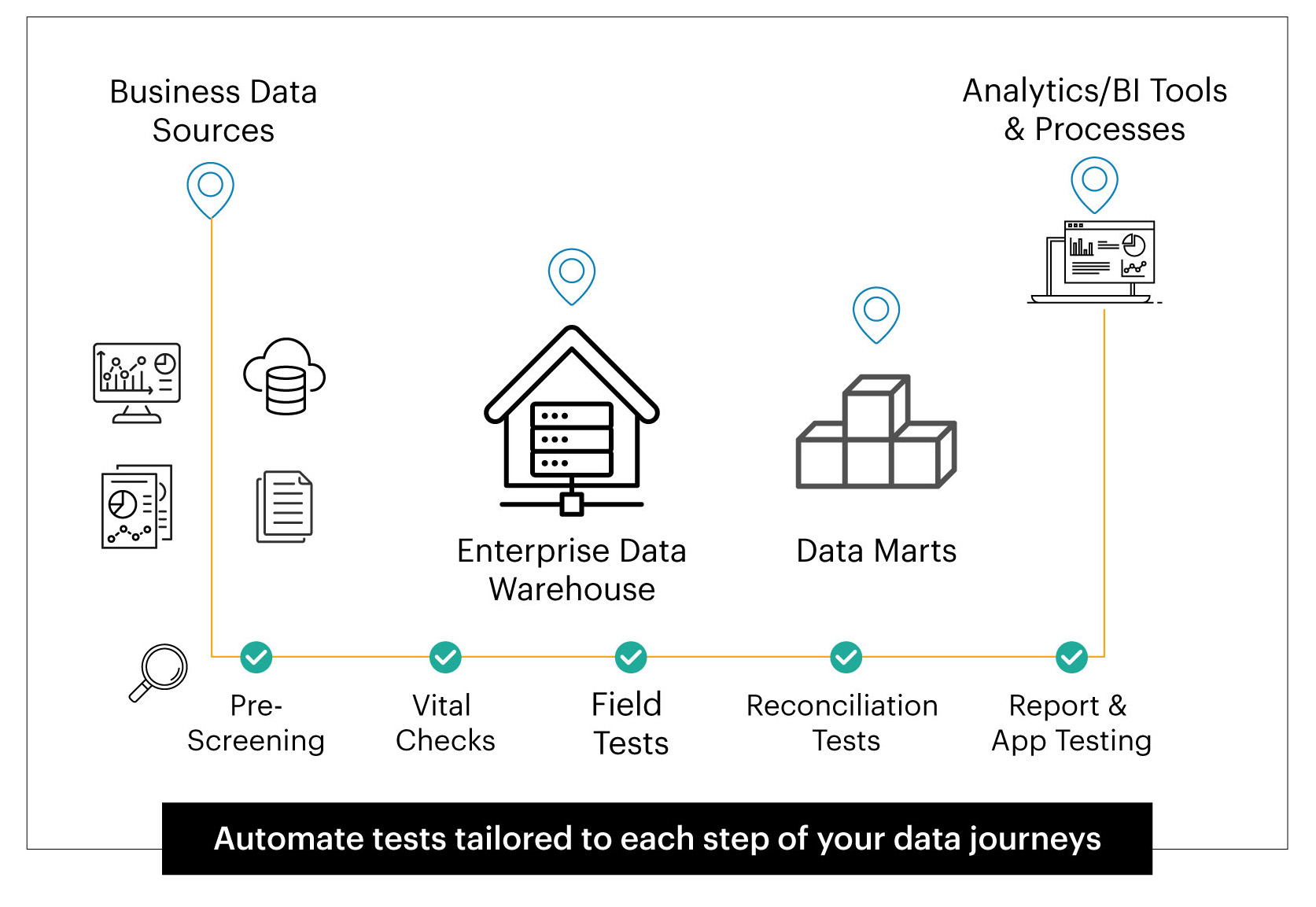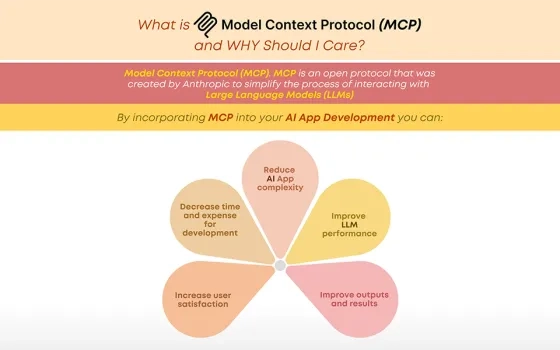Maintaining high data quality is crucial for organizations that rely on accurate, complete, and consistent information for mission-critical decisions. As data sources multiply and grow more complex, the challenge of maintaining data quality intensifies. This is where automated testing frameworks with advanced data quality tools offer a systematic and scalable solution to ensure that data meets the highest quality standards.
Whether it’s improving business operations or delivering meaningful insights to stakeholders, test automation tools improve data quality for the efficiency and success of analytics and business intelligence (BI) systems.
Here, we explore why organizations leverage automated testing frameworks for data quality, discuss their benefits, and highlight some in-demand technologies to improve data quality.
Why is Data Quality Critical?
Simply put, data quality refers to the accuracy, completeness, consistency, reliability, and relevance of data in an organization. Organizations depend on their data for several core operations, from reporting and compliance to predictive analytics and customer engagement. High-quality data is essential for making well-informed decisions, and its absence can lead to costly mistakes, poor business outcomes, and loss of trust in analytics systems.

Without efficient testing frameworks for data validation, poor data quality can lead to:
- Missed business opportunities
- Inaccurate reporting
- Customer dissatisfaction
- Increased operational costs
- Regulatory and compliance issues
Driving consistent data quality helps businesses avoid these costly pitfalls, foster better decision-making and maintain a trusted system of data use across departments.
Ways to Achieve Data Quality
Data quality is not only about avoiding mistakes; it’s about enabling businesses to remain competitive in a market where decisions need to be quick, reliable, and data driven.
To improve data quality, enterprises employ several measures such as:
1. Data Profiling: This process involves examining raw data to understand its structure, relationships, and patterns. It helps identify anomalies and areas where data does not conform to expected standards.
2. Set Guardrails with Topics & Instructions: This is the process of identifying and correcting errors or inconsistencies in datasets. This can involve handling missing data, standardizing formats, or removing duplicate records.
3. Data Validation: Data validation ensures that the data collected or used adheres to business rules and meets predefined quality standards.
4. Data Governance: A comprehensive framework that ensures data is handled consistently and responsibly throughout its lifecycle. It includes policies, roles, and procedures that define how data should be used and managed.
While these measures are indispensable, manually implementing and maintaining data quality at scale can be overwhelming, especially for enterprises dealing with large, dynamic datasets. That’s where automated testing frameworks play a critical role in improving data quality at scale. For instance, using automated data validation tools offers a faster, more efficient, and more reliable way for data validation testing, ensuring organizations can make informed decisions based on accurate and consistent information. Let’s explore examples of automated testing frameworks for data quality.
7 Popular Automated Testing Frameworks for Data Quality
Automated testing frameworks are a collection of guidelines, tools, and best practices designed to test software systems or data workflows in a structured and scalable manner. By automating tasks such as data validation, integrity checks, and error detection, these data-driven testing frameworks can execute tests in real-time, verify data against predefined rules, and produce reports without requiring manual intervention.
When seeking to improve data quality, automated testing frameworks can be used to validate data as it moves through the organization’s systems through continuous monitoring - so errors are caught early, and data is always ready for use.
Some popular testing frameworks for automated data quality checks are:
1. MobyDQ: An open-source powerhouse, MobyDQ automates data quality improvement. From catching anomalies to validating accuracy and ensuring data freshness, latency, and completeness, it keeps your pipelines in perfect sync. Designed for proactive data engineering teams, MobyDQ transforms monitoring and issue resolution into a seamless, high-impact process.
2. QuerySurge: A specialized data testing tool designed for automating and analyzing data validation processes, particularly in ETL (Extract, Transform, Load) testing. QuerySurge is an ideal solution for data warehouse testing, data migration validation, and big data analytics testing, ensuring that large data transfers between systems are accurate and consistent.
3. Ataccama: From profiling and cleansing to governance and enrichment, this technology enables AI-driven automation for data quality, providing everything you need in one platform. Its seamless integration with databases and apps allows for holistic data management, while intuitive tools help businesses maintain accuracy and reliability with minimal effort.
4. iceDQ: As a DataOps tool, iceDQ offers robust capabilities for testing and monitoring databases. It excels in ETL testing, data warehouse testing, and data migration scenarios. With its ability to validate data pipelines continuously, iceDQ ensures high-quality data throughout the data lifecycle.
5. Informatica Data Validation: Informatica’s user-friendly interface allows testers to create, execute, and maintain test cases quickly, ensuring the accuracy and consistency of data during the transformation and migration phases.
6. Talend Data Quality: With real-time profiling, machine learning-powered cleansing, and intuitive dashboards, it helps uncover anomalies, standardize data, and boost confidence with the Talend Trust Score. Perfect for teams aiming to automate data validation while protecting sensitive information, Talend ensures compliance and empowers smarter decisions across the board.
7. DataFold: A unified data observability platform that combines CI/CD testing, real-time monitoring, and anomaly detection to prevent data quality issues. By automating reconciliation, detecting schema changes, and leveraging machine learning for metrics tracking, it ensures data integrity across your entire stack, making it indispensable for agile data teams.
Why Automated Testing is in Demand for Data Quality Assurance
As data environments become increasingly complex, with more data coming in from diverse sources, manual data quality checks are no longer viable. Leveraging test automation for improving data quality empowers organizations to enforce high quality standards continuously and at a scale.
Automated testing strategies are especially in demand because:
- Data Complexity: The rise of big data means more complex datasets that require constant monitoring and testing. Automated frameworks can handle this complexity with ease.
- Real-Time Data Pipelines: In industries where real-time data is essential, automated frameworks ensure that only high-quality data is allowed through pipelines, providing faster and more accurate decision-making.
- Regulatory Compliance: With stricter data regulations like GDPR and HIPAA, maintaining data quality is not just important but mandatory. Automated testing ensures that data meets compliance requirements before it is used.
Without automated testing frameworks, organizations risk falling behind. Data inconsistencies may slip through the cracks, manual testing could slow down the pace of data initiatives, and the overall cost of maintaining data quality would skyrocket.
The Benefits of Automated Testing Frameworks in Data Quality
In a data-driven world, ensuring data quality is essential for success—and automated testing frameworks are the ultimate solution. These powerful tools transform data validation testing by eliminating manual errors, accelerating processes, and enhancing accuracy across complex workflows.
With automated data validation tools, businesses can improve data quality through faster feedback cycles, broader test coverage, and consistent, reliable results. Tools like Informatica Data Validation simplify data-driven testing frameworks, integrating seamlessly into existing systems and scaling effortlessly with changing needs.
By combining test automation for improving data accuracy with personalized workflows, organizations can tackle large-scale datasets, optimize operations, and achieve precision at every step. They are increasingly adopting automation in software testing to enhance data quality and unlock smarter, faster decision-making.

Here’s how QA automation for data quality is pivotal to address evolving business needs:
1. Flexibility & Scalability: Data-driven test automation frameworks can manage extensive datasets across multiple systems, performing intricate tests that would be impossible to handle manually. This ensures data quality is maintained consistently, even as the volume of data grows.
2. Speed & Efficiency: Automation dramatically increases the speed of data validation. Automated frameworks can detect errors or inconsistencies in real time, providing immediate feedback and preventing delays that manual testing would introduce, which could take weeks to execute.
3. Consistency & Accuracy: By automating the testing process, human error is eliminated, ensuring that tests are applied uniformly across all datasets. Pre-set rules and templates enable automated tools to achieve a high degree of accuracy in detecting issues.
4. Continuous Monitoring & Governance: Automated frameworks allow organizations to continuously monitor their data pipelines, instantly flagging any deviations or anomalies. Real-time tracking ensures that issues are identified and resolved quickly, preventing potential data integrity problems from escalating.
5. Save Time & Costs: While the initial setup of automated testing frameworks may require investment, the long-term benefits are significant. Automated frameworks reduce the need for manual intervention, cutting labor costs, and by catching errors early, they prevent expensive mistakes down the line.
Conclusion
In an era where data drives business decisions, maintaining impeccable data quality is not a luxury but a necessity. Automated testing frameworks stand as a cornerstone in this endeavor, enabling organizations to handle the growing complexity and volume of data with speed, precision, and scalability. By eliminating manual errors, enhancing consistency, and offering real-time insights, these frameworks empower businesses to make data-driven decisions confidently and efficiently.






















